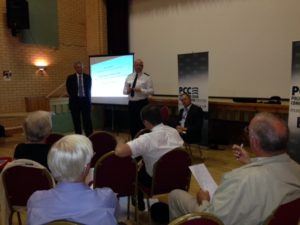Meeting Maldon
The beautiful district of Maldon played host to the Police and Crime Commissioner on Wednesday for his latest public meeting to discuss crime and community safety in each area of Essex. Nick Alston was joined by the North Local Policing Area Superintendent Steve Ditchburn, and local District Commander Chief Inspector Alan Cook. Also present were Community Safety Partnership (CSP) manager Spencer Clarke and his team, and Inspector Chris Kilgallen who is responsible for local policing in the Maldon area.
The meeting, held on June 11 in Maldon Town Hall, was well attended by the public, local councillors and Neighbourhood Watch co-ordinators, who generated a lively debate which focused on driving offences, crime reporting and Anti-Social Behaviour (ASB).
The PCC opened the event by stressing that he remains committed to holding public meetings since they are a unique opportunity to test the temperature of what’s happening locally and get meaningful feedback from communities on their perceptions of crime and the service that the police are delivering at the grass roots. The value of these events, Nick said, is that it allows the community to have a voice at both a local and strategic level, enhancing the police and partners’ ability to prevent emerging issues from escalating.
Nick also took this opportunity to reflect on Chief Constable Stephen Kavanagh’s “Three Seaxes of Essex” key priorities: reducing crime and harm; bringing offenders to justice; and ensuring people feel safer. He said this last element is particularly pertinent in somewhere like Maldon, which is one of the safest places to live in the country. Yet it’s important to acknowledge that crime does happen, and to work with the community to ensure the area remains extremely safe.
The new District Commander Alan Cook then took the opportunity to introduce himself, and was delighted that despite only having been in the role for a matter of weeks, he had already met so many of the people in attendance. Having spent almost 18 months as staff officer to the Chief Constable, he expressed his excitement to be working in such a wonderful part of the county and described his as the ‘best job out there’ as he looks forward to working with the community to deliver the best service he and his teams can.
Chief Insp Cook also expressed his enthusiasm about the direction the force was taking in the restructure of local policing, explaining the genuine emphasis on local supervision and accountability. This led to questions from the audience around policing numbers in Maldon. Although final details won’t be available until the end of the summer, Chief Inspector Cook explained that the restructure will put more resource back into local policing, giving local District Commanders more ownership over policing teams and reducing “silo working” by deploying highly professional officers to deal with cases from initial attendance to investigation. Chief Insp Cook committed to sharing final confirmed police officer numbers with the community once they were known, hopefully in August.
A particular concern for some of the audience was ASB and intimidation on the roads, with members of the public reporting that they had been repeatedly tail-gated and experienced other forms of aggressive and dangerous driving including frequent speeding by other motorists. One member of the public described how he had actually stopped a vehicle to challenge the behaviour of the driver on the basis that there were children nearby, and was shocked at the vitriolic and abusive response he received. A number of people agreed they had experienced similar things, and the PCC confirmed his commitment to improving driving standards.
Nick explained the work that has been done through the Essex-wide Casualty Reduction Board which includes high level representation from Essex Police and the Highways Agency, with the aim of reducing harm on the roads. He is committed to re-energising the work of the Casualty Reduction Board in the coming year.
One member of the audience asked the PCC to consider adopting existing schemes in other police forces such as the ‘Crackdown’ initiative run in Sussex. Nick stated he was interested in learning more about the scheme. He also described the success being achieved in Essex through offering driver improvement training for people stopped for minor driving offences, and said he would look at any strongly evidence-based options for enhancing current policing and partnership practice in this area.
Nick confirmed his commitment to developing innovative solutions to local problems as is highlighted in the eight priority areas of the Police and Crime Plan. However, as with all initiatives requiring funding from the public purse, Nick reiterated his commitment to ensuring there is a strong academic and operational evidence base behind things, so that we know they work through rigorous testing and examination. It is with this in mind that the PCC is encouraging Essex Police to continue to work with a number of universities to ensure there is robust analysis and an evidence base behind significant decision making.
Some members of the audience expressed a reticence in reporting ASB and driving offences, feeling the police wouldn’t have time or be able to deal with them. Both the District Commander and the PCC once again strongly urged the audience to continue to report crime and encourage others to do so, as the police will always aim to provide a proportionate response. Even if incidents appear minor, reporting crime and ASB helps to build a picture of issues and emerging trends. Nick explained his strong feelings that reporting crime is a civic duty, and said that unless people keep reporting crime we have ‘lost the battle before it even starts’.
Community Safety Partnership manager Spencer Clarke explained the role of the CSP in providing a link between the police, communities and other partners such as Essex County Fire and Rescue Service and the probation service. He gave a comprehensive presentation on work that the partnership is doing to tackle, disrupt and prevent anti-social behaviour and alcohol misuse, including numerous engagement, prevention and diversion schemes for young people at risk of offending. These include the boxing project operating in Chelmsford and Maldon, and a mentoring scheme for young people delivered in partnership with the YMCA – both of which are funded by the Office of the Police and Crime Commissioner. Spencer also explained the plethora of education and awareness programmes in place for young people to identify risk and divert young people away from risky behaviour. These include Crucial Crew, Reality Roadshows for older young people, and partnerships with the Angelus foundation focused on education around the dangers of new psycho-active substances which haven’t yet been criminalised.
The PCC spoke of his enduring support for crime prevention activity, demonstrated by the fact that despite the financial climate he has redirected some money from frontline policing into preventative work through the New Initiatives Fund: money spent on long-term prevention rather than enforcement just makes good sense. Spencer closed his presentation by explaining that the CSP continually looks at areas of need and concern and will direct problem-solving resources where they are needed most.
After two hours of interesting discussion and debate the Police and Crime Commissioner drew the meeting to a close by reminding everyone of exciting upcoming events being led by his office, including the first ever PCC Youth Conference on July 1, at the Anglia Ruskin University in Chelmsford, and the next Essex Police Challenge which will be held at the Balmoral Centre in Westcliff-on-Sea, Southend District, on July 2. He thanked everyone for attending and participating, and wished everyone a pleasant evening.










